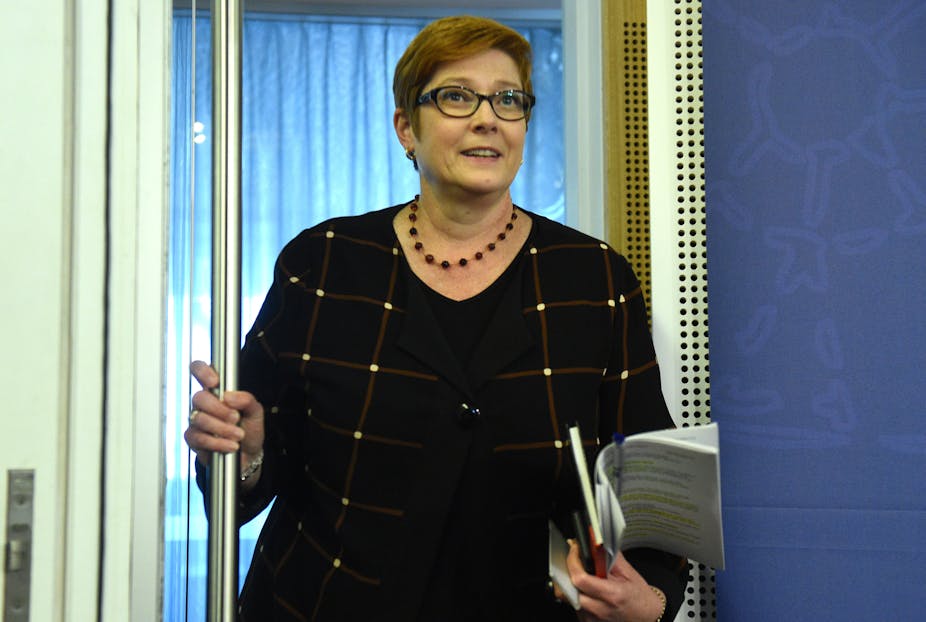The Australia-Japan foreign and defence ministers’ “two-plus-two” talks, due to be held in Japan before Christmas, are being deferred because of Defence Minister Marise Payne’s recent illness.
Payne, the first woman to hold the defence portfolio, had abdominal surgery for an infection and was off work for some weeks. Her illness has helped fuel speculation of a ministerial reshuffle, although government sources say they are confident she will get back to good health.
But the deferral of the two-plus-two meeting is likely to add to the speculation about her future, which has been intensified by what colleagues regard as the overt angling for her job by Defence Industry Minister Christopher Pyne.
Payne’s public performance has been consistently low-key, doing only minimal media, while Pyne maintains maximum public profile.
While Payne participated in Tuesday’s cabinet meeting by telephone, she is not well enough to travel to Japan for the meeting. She’s working but is not yet back in her office.
The Japanese are very formal about arrangements, so it is not possible to substitute another minister, or arrange a closer site for the meeting.
Foreign Minister Julie Bishop said the meeting would be rescheduled in the new year. “The Japanese understand that because of Minister Payne’s recent illness she has been advised not to travel. She is getting better but she’s had advice that she shouldn’t travel at this time.”
The deferral, coming at this time, is particularly unfortunate given the uncertainty generated by the election of Donald Trump to the US presidency. There are questions over his attitude to the region (especially to China) and to other matters – including defence issues, such as the joint strike fighter, which Australia is committed to purchasing.
Trump said this week in a tweet:
Australia is committed to buy 72 aircraft at a total cost $17 billion, including for local infrastructure upgrading.
Pyne, who is currently on a trip to Britain, France and Austria, said: “We are very confident that the joint strike fighter is the right jet for Australia and for the United States and rest of the world.”
In an address to the Policy Exchange think-tank in London on Monday, Pyne said this year’s defence white paper indicated the Australian Defence Force (ADF) would be operating in a more contested environment in its immediate region in the future.
“We will need to be far more active and have a higher operating tempo seeking to shape a positive regional environment,” he said.
“We know we will also be operating in a more dangerous environment, where states and non-state actors will have unprecedented capabilities to damage our forces and our interests.
"It will be far more challenging to operate, sustain and repair the ADF.
"This means we must have a stronger, more resilient and more capable Australian defence industry.
"The changes in our strategic environments mean we will need a defence industry that is ahead of the curve.”
Raising the issue of Australia and the UK working more closely together in the area of defence industry, Pyne said he would “be delighted to hold a government and industry meeting between key UK and Australian players next year. An Australian-UK defence and industry strategic dialogue would only strengthen our shared interests.
"And where better than my home town of Adelaide, increasingly the epicentre of Australian defence industry capability?”

